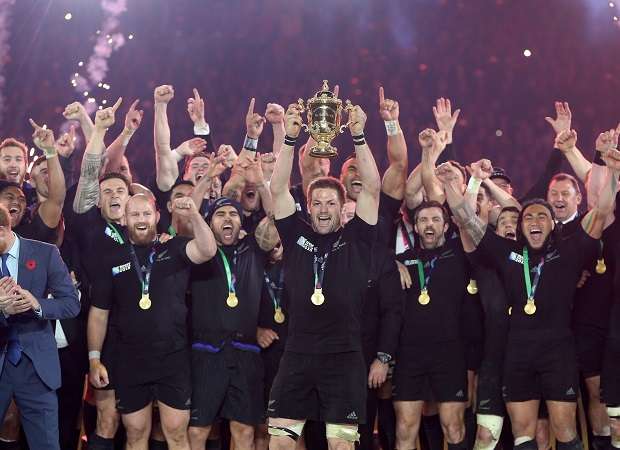 Eddie Jones was in full ogre-slaying mode this week, sounding like the armour-plated incarnation of St George as he talked about making England “bullet-proof” going into the 2019 World Cup. England's Aussie coach was alluding, in particular, to the challenge of getting England ready to meet – and beat – New Zealand after the RFU's confirmation that the two teams would play each other in the autumn series at Twickenham in November, 2018.
Eddie Jones was in full ogre-slaying mode this week, sounding like the armour-plated incarnation of St George as he talked about making England “bullet-proof” going into the 2019 World Cup. England's Aussie coach was alluding, in particular, to the challenge of getting England ready to meet – and beat – New Zealand after the RFU's confirmation that the two teams would play each other in the autumn series at Twickenham in November, 2018.
It has been a long time coming. It will be the first tim England have played New Zealand for four years. This is largely down to a World Rugby match-making format that is either a pig-out or a famine, with a three-Test tour, such as England's to NZ in 2014, followed by an autumn Test – followed by nothing.
To a lesser extent, it is also about New Zealand attempting to blackmail England into parting with half their gate money for the privilege of hosting the All Blacks at Twickenham. The RFU, quite rightly, told their New Zealand counterparts to take a hike.
However, it does not make any sense in terms of the promotion of international rugby that the team ranked first in the world, New Zealand, do not get to play the team ranked second, England, for that length of time. This is especially the case given that England have been in second place for the last 18 months.
The desperate need for greater competitiveness in the international arena has been highlighted by a Lions side which took the All Blacks to the brink in a drawn series over the summer, and an Ireland team that shared a two-Test series with them last autumn. Outside that almost every Test match New Zealand play in the Southern Hemisphere Rugby Championship, or against the poorer Northern Hemisphere sides, has become a ‘gimme'.
We did not need New Zealand's record 57-0 thrashing of South Africa in Auckland yesterday to illustrate the emptiness of a sport which promotes a procession of no contests.
Yet, this autumn series New Zealand play France, who have not beaten them in their last ten Tests. Although France are usually a more competitive beast at home, the fact that they were whitewashed three nil by South Africa over the summer is hardly a beacon of hope. They also play Scotland, a side who did not have a single test Lion – and who have never beaten them – and Wales, a nation who have not beaten New Zealand in 29 Tests since their last win in Cardiff in 1953.
 In addition, they play a Barbarians side, at Twickenham, full of players from every nation on the planet bar England – the side chasing them hardest.
In addition, they play a Barbarians side, at Twickenham, full of players from every nation on the planet bar England – the side chasing them hardest.
World Rugby should be mindful that one of the factors that pushed boxing into the doldrums for so long was that the best were very rarely pitted against the best, mainly because political manoeuvring between the sport's competing governing bodies resulted in poor match-making.
I'm not advocating that England should play New Zealand three times every season, particularly as a strong supporter of the principle that less is more when it comes to international rugby. However, when international rugby is played it should mean at the very least that we see competitive contests based on smart match-making.
If that means that England, or Ireland, who are currently the Northern Hemisphere's strongest sides, are awarded matches against New Zealand on merit – and Scotland, Wales, or France, forego their chance to play the world champions because they have not been sufficiently competitive – so be it. By the same token, if it were England and Ireland who were struggling to be competitive against New Zealand, they would be supplanted by those who were.
The same applies to Australia. Why should a side that have won one Test against New Zealand in 17 attempts since 2011 get to play three internationals against them every season? Two in the Rugby Championship is plenty.
The idea that international rugby should be run as a meritocracy, where the most competitive sides get some reward in terms of fixtures, is hardly revolutionary in the context of professional sport.
No one is suggesting that it should become a monopoly, but England should have played New Zealand once over the last two years, either last autumn or this. As double Six Nations champions, and three nil series winners in Australia in 2016, they earned the right. Furthermore, it should have been as part of World Rugby's designated international window, rather than a horse-trade outside it.
As for England's chances against the All Blacks, Jones has made it clear that he does not subscribe to the view that the Lions achieved the parity the final series scorecard suggested. Asked recently if the Lions were deserving victors in the second Test in Wellington he was circumspect: “Did you see the game? I rest my case.”
Jones argues that while England's Lions Test players grew in stature, and showed they could live with New Zealand, there is still ground to make up. “There's a gap between us and New Zealand. We are going in the right direction, but we have got a hell of a lot of work to get there.”
While I disagree with his Wellington assessment, Jones is right about there being a gap to bridge. One of the biggest challenges he faces as coach is the number of players he has to pick from in England, and choosing the right ones.
Jones has made a good fist of it so far, as his outstanding record with England shows. However, there would be nothing quite as instructive as a game against New Zealand for him to sort those with bullet-proof World Cup winner credentials from those who fall short – and he will have to wait another 12 months for those crucial Test results.


























